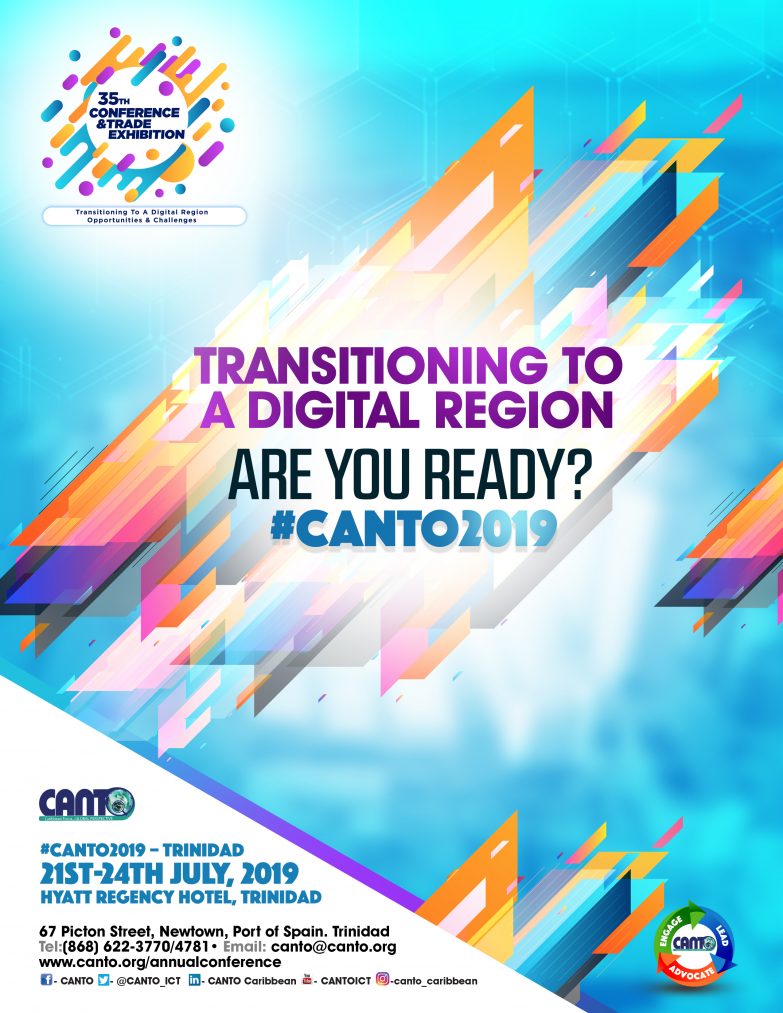CANTO Weekly Newsletter – BNamericas
Thursday, December 13, 2018
| Caribbean Watch: Caricel license to be revoked; tech restrictions lifted – Jamaica, Regional
Central America lawmakers step up cybercrime fight – Regional Liberty in advanced talks to acquire UTS – Caribbean Venezuela, Cuba to cooperate in space science – Cuba, Venezuela ICT: The week in 10 stories – Regional
|
| Our Mission “Influence the innovation and development of ICT solutions for the benefit of members by developing, navigating and leveraging relationships with all stakeholders.” “Advocate for policies, legislation and rules which advance the creation of an environment which facilitates the deployment of services and technologies around the region.” |
| Vision “To become the leading authority in shaping information, communication and technology in the Caribbean Region and the Americas.” |
| Caribbean Watch: Caricel license to be revoked; tech restrictions lifted – Jamaica, Regional
Jamaica’s Supreme Court has paved the way to revoke Caricel’s license to operate in the country after the telecoms operator ran afoul of authorities by selling its 4G unit to a South African company without clearing it first with authorities. The process dates back to February, when Symbiote Investments, the owner of Caricel, disclosed the sale of its unit, prompting the ministry of science to order the cancellation of its license. The company then appealed the process, but the court sided with the government. FRANCE LIFTS FREQUENCY RESTRICTIONS ON THE CARIBBEAN France’s telecommunications regulator Arcep was reported by regional media as lifting technical restrictions for telecommunications companies operating on the 900MHz and 2.1GHz frequencies on its Caribbean territories. The decision covers companies in Guadeloupe, Martinique, French Guiana, Reunion, Mayotte, Saint-Martin, Saint Barthelemy and Saint Pierre and Miquelon “Tech neutrality in the 900MHz and 2100MHz bands is in line with (Arcep’s) aim to ensure effective and fair competition between operators and the effective use and management of frequency bands,” specialized newspaper Telegeography said. Central America lawmakers step up cybercrime fight – Regional Cybercrime takes advantage of jurisdictions where legislation has not yet caught on to it, and Central American lawmakers are looking to work together to reduce its incidence in the region. A group under the name of the inter-parliamentary commission on citizens’ security and the administration of justice, made up of legislators from several countries in the region, met during the week in Guatemala’s congress to discuss common strategies to fight cybercrime, which this year has made a splash across global media with much publicized attacks on banks. The group committed to present a joint legal framework for countries to create their own anti-cybercrime legislation within the next 90 days, Guatemala’s congress said in a release on Friday. “Cyber criminals prefer to operate from countries where there are no laws against this type of felony, conducting millions of attacks daily,” the Central American parliament, which also includes the Dominican Republic, said in a statement. Guatemala’s efforts are focused on entering the global Budapest Convention on Cybercrime, of which Costa Rica, the Dominican Republic and Panamá are already members, it added. Liberty in advanced talks to acquire UTS – Caribbean Liberty Latin America is in advanced talks with the government of Curaçao to acquire fixed and mobile telecom provider UTS, the Curaçao Chronicle reported citing sources within Liberty. According to the report, the government has not yet decided on what percentage of the operator to sell. The government is being advised by a special commission, under the direction of former Central Bank director Alberto Romero, according to telecoms minister Zita Jesus-Leito. According to Telegeography, the government of Curaçao holds an 87.5% stake in UTS, which uses the Chippie brand, while the government of Sint Maarten owns the remainder (12.5%) Liberty Latin America, which consists of Chile’s VTR, Cable & Wireless Communications and Liberty Puerto Rico, split off in January from Liberty Global and has said it is actively seeking an inorganic growth strategy to better position itself in the region. The first acquisition, of 80% of Cabletica for approximately US$250mn was finalized in October. Liberty is seen to be going head to head with Millicom to position itself as the third largest regional telco after América Móvil and Telefónica. Liberty has an extensive presence in the Caribbean through Cable & Wireless. According to the report, the sale of UTS Curaçao is separate from UTS Sint-Maarten. This branch is in discussion with Telem and possibly other strategic partners. UTS serves the Dutch speaking Caribbean island territories of Curaçao, Bonaire, St. Maarten, St. Martin, St. Barths, St. Eustatius and Saba. Venezuela, Cuba to cooperate in space science – Cuba, Venezuela Venezuela’s space agency Abae has signed an agreement with Cuban state telco Etecsa to cooperate in space science, technology and innovation, according to Venezuelan telecoms regulator Conatel. The agreement was signed by Etecsa president Mayra Arevich and Abae head Camilo Torres during science and technology fair Fictec in Caracas, Abae tweeted. Venezuela has three satellites in orbit developed and launched with help from China and President Nicolás Maduro announced in September plans to launch a fourth, named Guaicaipuro, providing telecommunications services. The satellites are used for telephony, television, security, telemedicine, remote education, and territorial information for urban, agricultural and industrial planning. Cuba’s main international connectivity comes from the Alba-1 submarine cable, which runs from Venezuela to Cuba and Jamaica and was built by Venezuela-Cuba joint venture Telecomunicaciones Gran Caribe (TGC) and activated by Telefónica in 2013. However, in February this year, satellite company SES announced it would provide service to the island giving Cuba much-needed communications redundancy. Cuba took a major step last week when it launched 3G services nationwide and communications minister Jorge Luis Perdomo said the challenge for the island in 2019 is to deploy 4G technology. In November, Spain’s Telefónica offered to connect Cuba to its international cable network. Recent talks between the Cuban government and US technology giant Google are aimed at improving the positioning of Cuban content on the internet but are not related to building communications infrastructure in the country as reported by some media, the government said earlier this year. Former communications minister Maimir Mesa Ramos said in June there were 4.5mn Cubans accessing the internet, or 39% of the population, and the aim is to reach 50% internet in homes and 60% mobile penetration by 2020. ICT: The week in 10 stories – Regional CUBA State-owned teleco Etecsa is rolling out mobile internet to prepaid customers after several months of tests and limited deployment to contract users, a company executive told local media. BRAZIL Huawei opened an internet of things lab in São Paulo state. The first projects being developed in the Sorocaba center are in the areas of smart meters and smart public lighting. There are also talks with partners in the fields of car tracking, residential alarms and agribusiness. CHILE Chilean cryptocurrency traders have downplayed the importance of a supreme court ruling that could allow local banks to shut down their accounts. CARIBBEAN Financially troubled Irish-owned mobile operator Digicel has amended its offer to bondholders and offered an extension ahead of the December 7 deadline. MEXICO Telecommunications regulator IFT opened a public consultation process on a set of metrics aimed at helping it regulate correct usage of spectrum for telecoms. Mexico could increase its GDP by 7-15% by 2025 if it aligned its digitization efforts with global leaders such as Estonia and Malaysia but issues such as low internet access must first be addressed, according to a report by McKinsey. ARGENTINA Reaching 100% coverage with 4G and average broadband speeds of over 100Mbps are among the top connectivity priorities for Argentina for 2020, an official said. Representatives of major Latin American telecommunications companies gathered in Buenos Aires called for updated regulations on spectrum and infrastructure deployment, as well as a lower tax burden. PERU Telecoms regulator Osiptel is proposing to use new technology to monitor quality of service on operator networks in a move it says is to pressure them to step up their game. REGIONAL Finally, chipmaker Qualcomm unveiled the world’s first 5G processor. The company announced that the new devices with the Snapdragon 855 mobile platform are expected for the first half of 2019, and will be manufactured by Samsung, LG, Sony, ASUS and Motorola, among others. The information presented and opinions expressed herein are those of the author and do not necessarily represent the views of CANTO and/or its members
|


